
JMIR Formative Research
Scope & Guideline
Bridging Disciplines to Enhance Medical Research and Practice
Introduction
Aims and Scopes
- Digital Health Interventions:
The journal emphasizes research on the design, implementation, and evaluation of digital health interventions aimed at improving health outcomes, including mobile health (mHealth) apps, telehealth services, and web-based platforms. - User-Centered Design:
JMIR Formative Research promotes the importance of user-centered design in developing digital health solutions, ensuring that interventions are tailored to meet the needs and preferences of their target populations. - Behavior Change Strategies:
The journal explores various behavioral change strategies employed in digital health interventions, including motivational interviewing, gamification, and tailored messaging, aiming to enhance user engagement and adherence. - Cross-disciplinary Research:
The journal fosters interdisciplinary collaboration by publishing research that integrates insights from health sciences, engineering, social sciences, and technology to create holistic and effective digital health solutions. - Evaluation Methods:
JMIR Formative Research focuses on the development and application of robust evaluation methods for assessing the effectiveness, usability, and feasibility of digital health interventions.
Trending and Emerging
- Telehealth and Remote Monitoring:
The journal is increasingly publishing studies on telehealth and remote monitoring technologies, particularly in response to the COVID-19 pandemic, showcasing the growing acceptance and implementation of virtual care solutions. - Artificial Intelligence in Health Care:
There is a notable rise in research involving artificial intelligence (AI) applications in health care, including predictive analytics and machine learning, highlighting the integration of advanced technologies into digital health solutions. - Mental Health Apps:
Research on mobile applications specifically designed for mental health support is expanding, reflecting a heightened focus on addressing mental health issues through digital interventions. - Personalized Health Interventions:
The trend towards personalized health interventions, which tailor health care solutions to individual needs and preferences, is gaining momentum, emphasizing the importance of customization in digital health applications. - Community-based Participatory Research:
Emerging themes include the use of community-based participatory research methods in developing digital health solutions, ensuring that interventions are culturally sensitive and meet the specific needs of diverse populations.
Declining or Waning
- Traditional Health Interventions:
There is a noticeable decline in research centered on traditional, non-digital health interventions, as the focus shifts towards innovative digital solutions that offer greater scalability and accessibility. - General Health Promotion:
Publications related to general health promotion without a digital component are decreasing, reflecting a trend towards more specific, technology-driven health solutions. - In-Person Clinical Trials:
Research focusing on in-person clinical trials is becoming less common, as remote and digital methodologies gain traction, particularly in light of the COVID-19 pandemic. - Basic Health Education:
There is a diminishing emphasis on basic health education topics that do not leverage digital tools, as the journal prioritizes studies that incorporate technology into education and health literacy. - Offline Community Engagement:
The focus on offline community engagement strategies is declining, as digital platforms and virtual interactions become the primary mode for health interventions and research.
Similar Journals

Preventive Medicine Reports
Innovating preventive medicine through open access knowledge.Preventive Medicine Reports is a premier open-access journal published by Elsevier, dedicated to advancing the field of preventive medicine and public health. With a focus on innovative research and practices since its inception in 2014, this journal has established itself in the top quartile (Q1) of both Health Informatics and Public Health, Environmental and Occupational Health categories as of 2023. This positions it among the leading publications in its field, showcasing significant contributions to health informatics and public health strategies. The journal's accessibility allows researchers, professionals, and students worldwide to engage with cutting-edge studies that inform health policy and preventive initiatives. By fostering an open exchange of knowledge, Preventive Medicine Reports aims to reduce health disparities and improve population health outcomes, making it an essential resource for anyone invested in the future of health sciences.
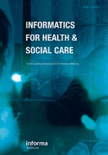
Informatics for Health & Social Care
Innovating practices for better health outcomes.Informatics for Health & Social Care is a leading journal published by Taylor & Francis Inc, dedicated to the intersection of health informatics and social care. With a strong emphasis on advancing knowledge in the fields of health information management and nursing, this journal has established itself as a vital resource for researchers and professionals seeking to explore innovative applications of informatics to improve patient outcomes and streamline healthcare delivery. Recognized for its influential contributions, it currently holds a Q2 ranking in both Health Informatics and Health Information Management, as well as a prestigious Q1 ranking in Nursing (miscellaneous) for 2023, signifying its critical role within the academic community. The journal is accessible for open access viewing, fostering a broader dissemination of research findings. Released continuously since 1976, it stands as a testament to the evolving landscape of health informatics, addressing pertinent issues and facilitating discussions that shape practices in health and social care delivery.
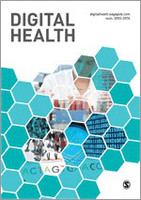
Digital Health
Connecting Research and Practice in the Digital Health Sphere.Digital Health is a pioneering open-access journal published by SAGE Publications Ltd, dedicated to advancing the field of health technology and its intersection with health policy, informatics, and the broader medical landscape. Since its inception in 2015, the journal has rapidly established itself as an essential resource for researchers, professionals, and students, serving as a platform for innovative research that leverages digital tools to improve health outcomes. Currently ranked in the Q2 category across four relevant domains, including Computer Science Applications and Health Informatics, it commands respect within the academic community. With its accessible framework, Digital Health facilitates the dissemination of critical findings and new methodologies that inform policy and practice. The journal’s commitment to open access promotes worldwide access and cooperation, making significant contributions to the evolving landscape of digital health.

JOURNAL OF MEDICAL INTERNET RESEARCH
Connecting Healthcare and Technology for a Healthier TomorrowJOURNAL OF MEDICAL INTERNET RESEARCH, published by JMIR PUBLICATIONS, INC, stands as a pivotal resource in the field of Health Informatics, with an esteemed ranking of #7 out of 138 in the Scopus database, placing it in the top 95th percentile. Since its inception in 1999, this Open Access journal has been committed to disseminating high-quality, peer-reviewed research that explores the intersection of healthcare and internet technologies. With its headquarters in Toronto, Canada, the journal encompasses a broad range of topics, including eHealth, telemedicine, and mobile health innovations. The impact factor and its Q1 quartile ranking highlight the journal's significant influence and prevalence in advancing the understanding of digital health landscapes. Researchers, professionals, and students alike benefit from its valuable insights, making the JOURNAL OF MEDICAL INTERNET RESEARCH an essential tool for fostering informed practices and policy-making in the rapidly evolving domain of health informatics.
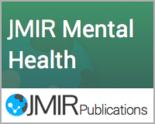
JMIR Mental Health
Exploring the frontiers of psychiatry and mental wellness.JMIR Mental Health is a leading peer-reviewed journal published by JMIR Publications, Inc in Canada, dedicated to exploring emerging topics in the fields of psychiatry and mental health. Since its inception in 2014, this Open Access journal has ensured that groundbreaking research is accessible to a global audience, housing innovative articles that address the critical mental health challenges of our time. With a 2023 impact factor placing it in the Q1 category within psychiatry and mental health and ranking 43rd among 567 journals according to Scopus, JMIR Mental Health is recognized for its significant contributions to academia. The journal’s rigorous peer-review process and commitment to high-quality research make it an invaluable resource for researchers, clinicians, and students aiming to advance their knowledge and practice in mental health. With a focus on interdisciplinary collaboration and the integration of technology in mental health care, JMIR Mental Health is at the forefront of driving innovation and improving mental health outcomes across diverse populations.
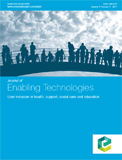
Journal of Enabling Technologies
Bridging Technology and Human PotentialThe Journal of Enabling Technologies, published by EMERALD GROUP PUBLISHING LTD, stands as a pivotal resource within the realms of Computer Science Applications, Health (Social Science), and Management of Technology and Innovation. Established in 2017 and converging towards its 2024 target, the journal has garnered significant recognition, reflected in its Q3 classification in multiple categories for 2023 and a commendable Q2 ranking in Rehabilitation. It holds respectable standings in Scopus rankings, notably positioning itself at the 38th percentile in Rehabilitation and 71st in Health Social Sciences. Aimed at promoting knowledge and innovation, the journal serves as an essential platform for researchers, professionals, and students, enabling them to explore advancements, share insights, and foster interdisciplinary collaboration. Although it does not offer open access, its impact factor and authoritative standing in the field underscore its importance for anyone dedicated to enhancing technology utilization across these vital sectors.

JMIR Cancer
Connecting the dots in cancer research and patient care.JMIR Cancer is a premier open access journal published by JMIR Publications, Inc., dedicated to advancing the field of cancer research and oncology. Since its inception in 2015, the journal has become an invaluable resource for researchers, clinicians, and students alike, providing a platform for the dissemination of cutting-edge research and clinical insights. Operating out of Canada, JMIR Cancer holds noteworthy rankings, including a Q3 position in Cancer Research and Q2 in Oncology as of 2023, highlighting its significant contribution to the scientific community. With the journal's open access model, articles are made freely available, ensuring that vital research reaches a wide audience and fosters collaboration across disciplines. By focusing on innovative research, translational studies, and clinical practices related to cancer, JMIR Cancer aims to be at the forefront of knowledge translation and tumor biology, bridging the gap between laboratory findings and patient care.

JMIR Public Health and Surveillance
Connecting researchers and practitioners for a healthier world.JMIR Public Health and Surveillance is a premier open access journal that has been at the forefront of public health research since its inception in 2015. Published by JMIR PUBLICATIONS, INC in Canada, this journal holds an impressive Q1 ranking in both Health Informatics and Public Health, Environmental and Occupational Health as of 2023. With a commendable Scopus Rank of #18 out of 665 in Public Health and #10 out of 138 in Health Informatics, JMIR Public Health and Surveillance stands out for its rigorous peer-reviewed articles that contribute significantly to the advancement of knowledge in these vital fields. The journal is committed to promoting research that advances the understanding and surveillance of health trends, disease outbreaks, and population health metrics, thus serving as an invaluable resource for researchers, professionals, and students alike. By facilitating open access to high-quality content, it ensures that results of critical public health research are readily available, ultimately helping to inform policy and public health initiatives across the globe.
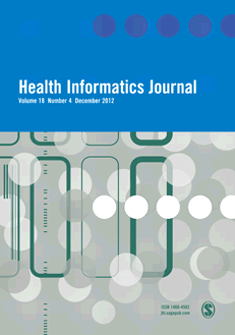
Health Informatics Journal
Unlocking insights at the intersection of health and technology.Health Informatics Journal, published by SAGE Publications Inc., serves as a premier platform for research and discussion in the dynamic field of health informatics since its inception in 1995. With an impressive Q2 ranking in the Health Informatics category and a notable 77th percentile ranking in the Scopus database, this journal provides an essential resource for academics and professionals alike. The journal's transition to Open Access since 2020 has further broadened its reach, ensuring that innovative research is accessible to a global audience. Covering a wide range of topics within health informatics, the journal aims to foster high-quality scholarly communication and facilitate the dissemination of cutting-edge insights that can help advance health care delivery and patient outcomes. With an ongoing commitment to excellence, the Health Informatics Journal is dedicated to enhancing the intersection of technology and healthcare through rigorous research and collaborative exploration.

International Journal of Health Policy and Management
Empowering Healthcare through Open Access ResearchThe International Journal of Health Policy and Management is a prestigious, open-access journal published by Kerman University of Medical Sciences, Iran, dedicated to fostering the exchange of knowledge and ideas in the field of health policy and management. Established in 2013, the journal has rapidly become a key resource for researchers, professionals, and students alike, showcasing impactful research with a commendable Q1 ranking in Health Policy, Health (Social Science), Leadership and Management, and other related fields in the 2023 category quartiles. Its Scopus rankings further highlight its influence, with significant standings across various disciplines, including a percentile of 93rd in Nursing Leadership and Management. With an emphasis on open-access publishing, the journal ensures that groundbreaking research is readily available to a global audience, enhancing collaboration and innovation in healthcare management and policy. As it converges its efforts through 2024, the journal continues to provide a platform for scholarly discourse, striving to shape the future of health policy and management on a global scale.